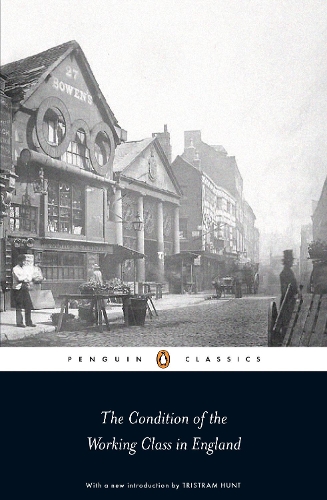
The Condition of the Working Class in England
(Paperback)
Publishing Details
The Condition of the Working Class in England
By (Author) Friedrich Engels
Edited by Victor Kiernan
Introduction by Tristram Hunt
Penguin Books Ltd
Penguin Classics
16th September 2009
7th May 2009
United Kingdom
Classifications
Professional and Scholarly
Non Fiction
European history
Social classes
305.562094209034
Physical Properties
Paperback
336
Width 130mm, Height 198mm, Spine 18mm
252g
Description
'The social war, the war of all against all, is here openly declared' Written when Engels was only twenty-four, and inspired in particular by his time living amongst the poor in Manchester, this forceful polemic explores the staggering human cost of the Industrial Revolution in Victorian England. Engels paints an unforgettable picture of daily life for workers - depicting overcrowded housing, abject poverty, child labour, sexual exploitation, dirt and drunkenness - in a savage indictment of capitalism's greed and social injustices. His fascinating later preface, written for the first English edition of 1892 and included here, brought the story up to date in the light of forty years' further reflection. A masterpiece of committed reportage and an impassioned call to arms, this is one of the great pioneering works of social history and an economic critique of unfettered markets that still resonates today. Based on the original translation by Florence Wischnewetzky, this volume is edited by Victor Kiernan, with a new introduction by historian Tristram Hunt discussing Engel's life and the book's position as a defining text of the British industrial experience. Also included are notes, a chronology and an updated further reading. Edited with notes by VICTOR KIERNAN with a new introduction by TRISTRAM HUNT
Author Bio
Date- 2013-08-06 Charles Darwin was born on February 12, 1809 in Shropshire, England. He was educated at Edinburgh University and Christ's College, Cambridge. Between 1831 and 1836 he travelled in South America aboard the H.M.S Beagle to explore the geology and natural history of the area, and published his journal of findings in 1839. His most famous book On the Origin of the Species by Means of Natural Selection, appeared in 1859 and is arguably one of the most important scientific works ever published. The theories of evolution and natural selection proposed in this book and The Descent of Man (1871) are still the subject of intense debate and scrutiny today. Charles Darwin died on 19 April, 1882 and was buried in Westminster Abbey. Karl Marx was born in 1818 in Trier, Prussia. While attending university in Berlin he was influenced by the ideas of the philosopher Hegel and his critics, the Young Hegelians, but Marx eventually rejected both schools of thought. He quickly earned the reputation of a revolutionary and left Germany for Paris, where he met his lifelong friend and collaborator, Friedrich Engels. Together they wrote and published The Communist Manifesto, which was published in 1848, just before the first wave of revolutions in France. Marx returned to Germany but his radical activities led to expulsion, whereupon he moved to Lon
